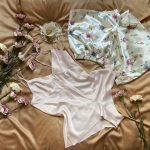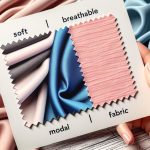Looking to shop for ethical fashion brands that prioritize natural fibers? Look no further!
In this article, we’ve rounded up 12 fantastic brands that are committed to using sustainable materials like organic cotton, linen, bamboo, hemp, silk, recycled polyester, Tencel, modal, alpaca, cashmere, leather, and cork.
By choosing these brands, you can feel good about supporting environmentally-friendly fashion choices without compromising on style.
Get ready to discover your new favorite sustainable fashion labels!
Table of Contents
Organic Cotton Clothing Brands
Discover five organic cotton clothing brands that prioritize sustainability and ethical fashion. These brands understand the importance of fair trade organic cotton and sustainable cotton farming practices. By choosing organic cotton, they ensure that the cotton is grown without the use of harmful pesticides and chemicals, protecting both the environment and the farmers who grow it.
One such brand is Patagonia, which has been a pioneer in sustainable fashion for decades. They use 100% organic cotton in their clothing and have strict standards for fair trade practices.
Another brand, People Tree, is known for its commitment to fair trade and organic cotton. They work directly with farmers and artisans to create their clothing, ensuring fair wages and safe working conditions.
Eileen Fisher is another brand that prioritizes sustainability. They have a dedicated line of organic cotton clothing and are committed to reducing their environmental impact.
Another great option is prAna, which not only uses organic cotton but also supports sustainable farming practices through their partnership with the Fair Trade Certified program.
Finally, there’s Pact, a brand that exclusively uses organic cotton in their clothing. They’re committed to transparency and ensuring that their products are made ethically.
Sustainable Linen Fashion Brands
When shopping for ethical fashion, consider sustainable linen fashion brands. Linen is a versatile and sustainable fabric that’s becoming increasingly popular in the fashion industry. Here are some reasons why sustainable linen fashion brands should be on your radar:
-
Sustainable Linen Manufacturing Processes: One of the key benefits of linen as a sustainable fabric is the manufacturing process. Linen is made from the fibers of the flax plant, which requires less water and pesticides compared to other crops like cotton. Additionally, the entire flax plant can be used, minimizing waste and maximizing sustainability.
-
Environmental Benefits: Linen is a biodegradable and recyclable fabric, meaning it has a minimal impact on the environment. It’s also a low carbon footprint fabric, as it requires less energy to produce compared to synthetic fabrics.
-
Breathability and Durability: Linen is known for its breathability and durability. It’s a lightweight fabric that allows air to flow freely, making it perfect for hot weather. Additionally, linen is a strong fabric that can withstand regular wear and washing, ensuring longevity and reducing the need for frequent replacements.
-
Versatility: Sustainable linen fashion brands offer a wide range of clothing options, from casual everyday wear to formal attire. Linen can be woven into different textures and styles, making it suitable for various occasions and personal preferences.
Bamboo Fiber Fashion Labels
Have you considered sustainable bamboo clothing?
Bamboo fabric is becoming increasingly popular in the fashion industry due to its eco-friendly nature.
Not only is bamboo a renewable resource, but it also requires minimal water and pesticides to grow, making it a more sustainable alternative to traditional fabrics.
Sustainable Bamboo Clothing
Sustainable bamboo clothing’s popularity has grown as more fashion-conscious consumers seek out responsible and eco-friendly options. Here are some reasons why sustainable bamboo clothing is gaining traction in the fashion industry:
-
Environmental benefits: Bamboo is a fast-growing plant that requires minimal water and no pesticides, making it a sustainable and renewable resource.
-
Soft and comfortable: Bamboo fabric is known for its silky texture and breathability, making it a great choice for clothing that feels luxurious against your skin.
-
Antibacterial properties: Bamboo contains a natural antibacterial agent called bamboo kun, which helps to keep your clothes fresh and odor-free.
-
Versatility and style: Sustainable bamboo clothing isn’t only good for the environment, but it also offers a range of fashionable options, from casual wear to formal attire.
With these benefits and the growing sustainable bamboo fashion trends, it’s no wonder that more people are turning to bamboo clothing as a conscious choice for their wardrobe.
Benefits of Bamboo Fabric?
As you explore ethical fashion brands using natural fibers, you’ll discover the numerous benefits of bamboo fabric, including its sustainability and versatility.
Bamboo fabric is gaining popularity in the fashion industry due to its eco-friendly manufacturing techniques and its positive impact on the environment. One of the major benefits of bamboo fabric is its sustainability. Bamboo is a fast-growing plant that requires no pesticides or fertilizers, making it a renewable and environmentally friendly resource. Additionally, bamboo fabric is biodegradable, meaning it can decompose naturally without causing harm to the environment.
Another advantage of bamboo fabric is its versatility. It’s incredibly soft, hypoallergenic, and has moisture-wicking properties, making it ideal for activewear and undergarments. Furthermore, bamboo fabric is breathable, insulating, and UV protective, making it suitable for a wide range of clothing items.
When choosing ethical fashion brands, opting for bamboo fabric can be a conscious choice that supports sustainable and eco-friendly practices.
Hemp Clothing Companies
Supporting ethical fashion means choosing hemp clothing brands. Hemp clothing offers numerous benefits and is becoming increasingly popular in fashion trends.
Here are four reasons why you should consider supporting hemp clothing companies:
-
Sustainability: Hemp is a highly sustainable plant that requires minimal water and no pesticides to grow. Choosing hemp clothing helps reduce the environmental impact of the fashion industry.
-
Durability: Hemp fabric is incredibly durable and long-lasting. It can withstand frequent washing and wear, making it a great investment for your wardrobe.
-
Breathability: Hemp clothing is breathable and allows air to circulate, keeping you cool and comfortable in hot weather. It also has excellent moisture-wicking properties, making it suitable for all seasons.
-
Versatility: Hemp fabric can be blended with other fibers, such as organic cotton or silk, to create versatile and stylish garments. From casual t-shirts to elegant dresses, hemp clothing offers a wide range of options for every occasion.
In terms of hemp fashion trends, you can find a variety of clothing items made from hemp, including jeans, jackets, shirts, and even accessories like bags and hats. These brands aren’t only eco-friendly but also offer fashionable and high-quality products. By choosing hemp clothing, you can support sustainable fashion and make a positive impact on the environment.
Eco-friendly Silk Brands
Looking for sustainable alternatives to traditional silk? Well, you’re in luck!
Eco-friendly silk brands are making waves in the fashion industry, offering ethically produced silk that’s both luxurious and environmentally conscious.
With a focus on sustainable silk production methods, these brands are revolutionizing the way we think about silk, providing a guilt-free option for those who value both style and sustainability.
Sustainable Silk Alternatives
You can discover eco-friendly silk brands that provide sustainable alternatives to traditional silk. These brands are committed to promoting eco-friendly fashion and reducing the negative impact of silk production on the environment.
Here are four sustainable silk alternatives to consider:
-
Peace Silk: Also known as Ahimsa silk, this type of silk is produced without harming the silkworms. The cocoons are allowed to hatch naturally, and the silk is then extracted.
-
Vegan Silk: Made from plant-based fibers such as pineapple leaves or banana stems, vegan silk offers a cruelty-free and eco-friendly option.
-
Recycled Silk: This type of silk is made from discarded silk fabric or waste silk fibers. By repurposing these materials, recycled silk helps reduce waste and conserve resources.
-
Organic Silk: Produced without the use of harmful chemicals or pesticides, organic silk is grown using sustainable farming practices, making it a more environmentally friendly choice.
Ethical Silk Production
Continuing with the exploration of sustainable silk alternatives, there are several ethical fashion brands that prioritize eco-friendly silk production. These brands recognize the need for ethical silk production methods that minimize harm to both the environment and the workers involved in the silk-making process. By using sustainable silk alternatives, such as organic silk or peace silk, these brands ensure that their products are produced in a way that’s both environmentally and socially responsible.
Ethical silk production involves various practices that prioritize sustainability. For example, some brands source their silk from organic farms that don’t use harmful chemicals or pesticides. Others use peace silk, also known as ahimsa silk, which is produced without killing the silkworms. Instead, the cocoons are harvested once the silkworms have naturally left them. This method ensures that no harm is caused to the silkworms during the silk extraction process.
Additionally, these eco-friendly silk brands often prioritize fair trade practices, ensuring that the workers involved in the silk production are paid fair wages and work in safe conditions. They also strive to minimize waste and reduce the carbon footprint of their production processes.
Ethical Wool Fashion Brands
One ethical wool fashion brand to consider is known for its commitment to sustainability and animal welfare. This brand ensures ethical wool sourcing and cruelty-free wool production practices. Here are four reasons why you should support ethical wool fashion brands:
-
Animal welfare: Ethical wool fashion brands prioritize the well-being of the animals. They ensure that the sheep providing the wool are treated with kindness and respect.
-
Sustainable practices: These brands are dedicated to sustainable wool production. They focus on minimizing negative environmental impacts by using eco-friendly techniques and materials.
-
Fair trade: Ethical wool fashion brands often work with local farmers and communities, providing fair wages and promoting economic empowerment.
-
Traceability: These brands prioritize transparency and provide detailed information about the origin of their wool. They ensure that the wool comes from responsible sources, free from any unethical practices.
Natural Fiber Denim Brands
To explore the world of natural fiber denim brands, let’s delve into the sustainable options available in today’s market. When it comes to denim, many brands are now offering natural fiber denim alternatives that aren’t only stylish but also eco-friendly. These brands are committed to using materials that have a lower environmental impact and adopting eco-friendly denim production techniques.
One popular natural fiber denim alternative is organic cotton denim. Organic cotton is grown without the use of harmful chemicals and pesticides, making it a more sustainable option compared to conventional cotton denim. Brands like Patagonia, Nudie Jeans, and Outerknown are known for using organic cotton in their denim products.
Another natural fiber option is hemp denim. Hemp is a highly sustainable material that requires less water and fewer pesticides compared to conventional cotton. Brands like Madewell and Levi’s have started incorporating hemp into their denim collections, offering consumers a more eco-friendly choice.
In addition to organic cotton and hemp, some brands are also exploring other natural fibers like linen and Tencel. Linen denim is lightweight and breathable, perfect for warmer climates, while Tencel denim is made from sustainably sourced wood pulp and has a soft, luxurious feel.
Jute and Sisal Fashion Labels
If you’re looking for sustainable plant-based textiles, jute and sisal fashion labels are worth exploring.
These eco-friendly alternatives offer a natural fiber fashion trend that aligns with ethical values.
Embracing jute and sisal clothing allows you to make a conscious choice towards a more environmentally friendly wardrobe.
Sustainable Plant-Based Textiles
Are you curious about which ethical fashion brands are utilizing sustainable plant-based textiles like jute and sisal in their fashion labels? Look no further! Here are four brands that are leading the way in using these eco-friendly fabric options:
-
Reformation: Known for their stylish and sustainable clothing, Reformation incorporates jute and sisal into their collections. They believe in creating fashion that’s both beautiful and environmentally conscious.
-
People Tree: This brand focuses on fair trade and sustainable fashion. They use natural fibers like jute and sisal to create their ethical clothing, ensuring that their garments have a minimal impact on the environment.
-
Thought: With their commitment to sustainability, Thought uses jute and sisal to produce their eco-friendly clothing. They prioritize natural and renewable materials in their designs.
-
Nomads: This brand is dedicated to creating ethical clothing using sustainable plant-based textiles. Jute and sisal are among their fabric options, reflecting their eco-conscious approach.
These brands are just a few examples of the fashion industry’s shift towards sustainable plant-based textiles. By choosing clothes made from these materials, you can make a positive impact on the environment.
Eco-Friendly Fashion Alternatives
Now let’s explore some eco-friendly fashion alternatives by looking at jute and sisal fashion labels.
If you’re searching for sustainable hemp clothing or eco-friendly alternatives to leather, these options may be perfect for you. Jute, a natural fiber derived from the jute plant, is known for its strength and versatility. It can be transformed into various fashion items, including bags, shoes, and clothing. Jute fashion labels offer a sustainable and ethical choice for fashion-conscious individuals.
On the other hand, sisal is a fiber extracted from the sisal plant. It’s often used in the production of accessories like hats, bags, and belts. Sisal fashion labels provide an eco-friendly alternative to leather, offering stylish and cruelty-free choices for conscientious consumers.
Consider supporting these eco-friendly brands to make a positive impact on the fashion industry.
Natural Fiber Fashion Trends
Continuing from the previous subtopic, let’s now explore the current fashion trends in natural fibers, specifically jute and sisal fashion labels.
Natural fiber accessories and sustainable knitwear brands have been gaining popularity in recent years. Here are some of the latest trends you can expect to see:
-
Boho-chic bags: Jute and sisal bags are a must-have accessory this season. Their earthy tones and woven textures add a touch of bohemian flair to any outfit.
-
Eco-friendly footwear: Natural fiber sandals and espadrilles aren’t only stylish but also sustainable. They’re made from renewable materials, making them a great choice for conscious consumers.
-
Knitwear with a twist: Sustainable knitwear brands are incorporating jute and sisal fibers into their designs. This adds an interesting texture and a unique touch to cozy sweaters and cardigans.
-
Statement accessories: From hats to belts, natural fiber accessories are making a statement on the runway. They add a natural and eco-friendly element to any ensemble.
These fashion trends showcase the versatility and beauty of jute and sisal, while also promoting sustainable and ethical fashion choices.
Recycled Polyester Fashion Brands
You can discover ethical fashion brands that utilize recycled polyester as a sustainable alternative. Recycled polyester, also known as rPET, is a synthetic fiber made from recycled plastic bottles. It’s an innovative solution to the environmental issues caused by traditional polyester production. By using recycled polyester, these brands are reducing the demand for new polyester production and diverting plastic waste from landfills and oceans.
One of the key benefits of recycled polyester is that it requires fewer resources to produce compared to its virgin counterpart. It reduces energy consumption, water usage, and greenhouse gas emissions. Additionally, it helps to mitigate the dependence on fossil fuels, as it utilizes existing plastic waste as a raw material.
There are several ethical fashion brands that have embraced recycled polyester alternatives in their collections. These brands prioritize sustainability and craftsmanship, while also offering stylish and high-quality clothing. They’re committed to transparency and ethical practices throughout their supply chains.
Tencel and Modal Clothing Companies
One of the key benefits of recycled polyester is its ability to reduce the environmental impact of clothing production.
Tencel and Modal clothing companies have also made significant strides in sustainability. These companies prioritize the use of natural fibers in their production processes, specifically Tencel and Modal.
Here are four reasons why Tencel and Modal clothing companies are leading the way in ethical fashion:
-
Environmentally-friendly production: Tencel and Modal are made from sustainably sourced wood pulp, which is then processed using an eco-friendly closed-loop system. This means that the chemicals used in the production process are recycled and reused, minimizing waste and reducing environmental harm.
-
Soft and breathable fabrics: Tencel and Modal fabrics offer superior comfort due to their natural properties. They’re soft to the touch, breathable, and moisture-wicking, making them perfect for all-day wear.
-
Biodegradability: Tencel and Modal fibers are biodegradable, meaning that they can naturally decompose over time. This reduces the amount of waste that ends up in landfills and contributes to a more sustainable fashion industry.
-
Reduced water usage: The production processes for Tencel and Modal require significantly less water compared to other fabrics like cotton. This conservation of water resources helps to alleviate the strain on freshwater supplies and promotes a more sustainable approach to fashion.
Alpaca and Cashmere Ethical Brands
Tencel and Modal clothing companies have paved the way in ethical fashion, and now let’s delve into the world of alpaca and cashmere ethical brands. When it comes to alpaca and cashmere sustainability, ethical sourcing of these fibers is of utmost importance.
Alpaca and cashmere are both luxurious natural fibers that are known for their softness and warmth. However, the production of these fibers can have negative environmental and ethical impacts if not done responsibly. That’s why ethical brands that prioritize sustainability are crucial in this industry.
Ethical sourcing of alpaca and cashmere fibers involves ensuring that the animals are treated well and that their welfare is prioritized. This means providing them with proper living conditions, access to pasture, and preventing any unnecessary harm or suffering.
Additionally, ethical brands also consider the environmental impact of alpaca and cashmere production. They strive to minimize the use of harmful chemicals and reduce water consumption during the manufacturing process. They may also support initiatives that promote reforestation and biodiversity conservation in the areas where these fibers are sourced.
Sustainable Leather and Cork Fashion Labels
When considering ethical fashion brands using natural fibers, it’s important to explore sustainable leather and cork fashion labels. These brands prioritize the use of materials that are environmentally friendly and cruelty-free. Here are four examples of sustainable leather and cork fashion labels that offer stylish and ethical options for conscious consumers like yourself:
-
Stella McCartney: This renowned brand is known for its commitment to sustainability and offers a range of sustainable vegan footwear. They use innovative materials like vegetarian leather made from recycled polyester and plant-based alternatives to create fashionable and cruelty-free shoes.
-
Matt & Nat: This Canadian brand specializes in eco-conscious cork accessories. They use high-quality cork, a renewable and biodegradable material, to create stylish bags and wallets. Matt & Nat also incorporates recycled materials like nylon and plastic bottles into their designs, further reducing their environmental impact.
-
Bourgeois Boheme: This London-based brand focuses on creating sustainable vegan footwear that combines style with ethical manufacturing practices. They use non-toxic and eco-friendly materials like Piñatex, a leather alternative made from pineapple leaf fibers, to craft their shoes.
-
Corkor: This Portuguese brand is dedicated to producing vegan accessories using sustainable cork. They source their cork from certified forests and use it to create a range of products, including bags, wallets, and belts. Corkor is committed to reducing waste and promoting a circular economy by creating durable and timeless pieces that can be enjoyed for years.
Frequently Asked Questions
What Are the Benefits of Using Natural Fibers in the Fashion Industry?
Using natural fibers in the fashion industry has many benefits. Sustainable fashion brands prioritize these fibers because they are eco-friendly, biodegradable, and help reduce the carbon footprint of the industry.
How Are Natural Fibers Different From Synthetic Fibers?
Natural fibers, like cotton and silk, are derived from plants or animals, while synthetic fibers are man-made. The main difference lies in their environmental impact, as natural fibers are biodegradable and renewable, while synthetic fibers contribute to pollution and take longer to decompose.
Are Natural Fibers More Expensive Than Synthetic Fibers?
When it comes to comparing costs, natural fibers tend to be more expensive than synthetic fibers. Price comparison between natural and synthetic fibers shows that the former usually comes at a higher price point.
How Can I Tell if a Fashion Brand Is Using Genuine Natural Fibers?
To identify genuine natural fibers in fashion brands, look for labels that mention specific materials like cotton, silk, or linen. Additionally, research the brand’s sustainability practices and inquire about their sourcing methods to understand the impact of synthetic fibers on the environment.
Are There Any Certifications or Standards That Ensure the Ethical Production of Natural Fiber Clothing?
There are several ethical fashion certifications and sustainable fashion standards that ensure the ethical production of natural fiber clothing. These certifications and standards help you identify brands that prioritize sustainability and ethical practices.
- Is Silk a Nonwoven Fabric? - July 11, 2025
- Is Cotton Typically Woven or Nonwoven? - July 11, 2025
- Is Chenille a Woven or Nonwoven Fabric? - July 11, 2025






